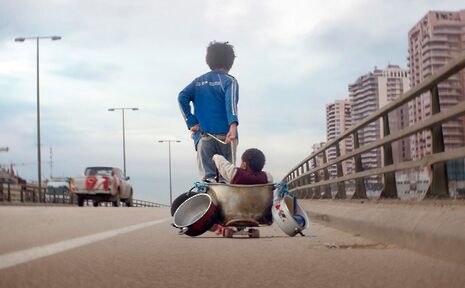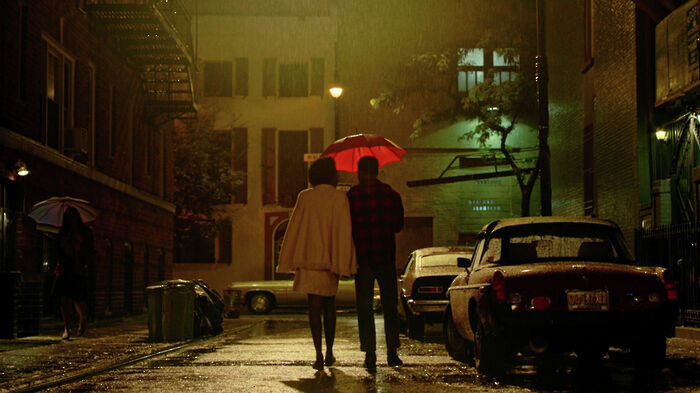Miracle at Capernaum
Moved by the story of child suing his parents, Theo Howe reflects on a powerful drama.

Directed by Nadine Labaki
Starring Zain Al Rafeea, Yordanos Shiferaw, Boluwatife Treasure Bankole
Released 22 February
Capernaum, the Village of Nahum, was a locale in the New Testament where Jesus performed a number of minor miracles. We see the title, also subtitles ‘Chaos’, splayed over a view of Beirut’s skyline. Both titles make for an interesting lens through which to view the film. Capernaum is indeed a story of chaos, but also one of someone seeking to be saved, but miracles don’t really happen anymore.
The biggest surprise that d came about half an hour in, when it became obvious that Zain, a boy of about twelve years old who is suing his parents for bringing him into this world, is going to carry the entire film. Not just that, but child actor Zain al Rafeea is the perfect mix of vulnerable, resourceful, and impetuous that the audience doesn’t just sympathise with him, we are compelled by everything he does to get by.
It would have been easy for Capernaum to become unendingly grim, seeing Zain move in with Rahil, an illegal immigrant and her baby Yonas before she is brutally taken away and Zain and Yonas have to fend for themselves. Director Nadine Labaki still gives necessary weight to how terrifying it could be to have everyone you care about removed, maimed, killed; but at the heart of it, she does not beat you over the head with tales of horrible strife, and crafts a remarkable story.
It’s a story that perhaps one wasn’t expecting to be terribly interesting from the first twenty minutes. The film truly comes into its own when Zain runs away from his house, going to rough it in Beirut. As upsetting as parts of the film can be, the city is shot with a real sense of love and passion. Labaki doesn’t miss an opportunity to show some rough areas where people will gladly enter into fights over shots of Tramadol laced water, but she also celebrates the local neighbourhoods, the souk, the elderly man who dresses up as the fictitious superhero Cockroach Man. Capernaum would simply not work without the city of Beirut behind it, and it’s been a very long time since I can remember feeling like I was so deeply within a setting.
Outside of the city streets, and into the interiors is where we can find one of very few weaknesses with Capernaum. The film opens with Zain in court, suing his parents. We flash forward to this setting a few times in the film as a type of framing device. It works somewhat at the start, but we return to it so infrequently that these scenes in the courtroom feel more like an afterthought, and they create a confused type of chronology that Labaki could probably have easily avoided by spending a couple more days on the script.
So does Capernaum represent chaos, or a place where miracles can genuinely happen? At points it hints towards total pandemonium, but that isn’t all there is. The central conceit would seem to indicate a message of antinatalism: where there is life there is no hope. This doesn’t even begin to cover Capernaum; perhaps that is part of it, but there has to be hope, there must be hope.
It would be wrong to say that Capernaum hits you like a ton of bricks; it is slower, and far more subtle than that. Labaki juggles a lot of different themes, but it never feels unfocused or rushed. She jumps from humour to poignancy with such aplomb that by the end, all of your emotions are spent, and you watch the credits roll, knowing that you have seen something truly special. Al Rafeea and Boluwatife Treasure Bankole, who plays the baby Jonas give spectacular performances, and it is they who deserve the greatest credit for how good the film is. Capernaum depicts a world where children and adults seem to have swapped roles, and perhaps only through the children can we escape chaos. That would indeed be a miracle.
 News / Cambridge study finds students learn better with notes than AI13 December 2025
News / Cambridge study finds students learn better with notes than AI13 December 2025 Features / Should I stay or should I go? Cambridge students and alumni reflect on how their memories stay with them15 December 2025
Features / Should I stay or should I go? Cambridge students and alumni reflect on how their memories stay with them15 December 2025 News / Uni Scout and Guide Club affirms trans inclusion 12 December 2025
News / Uni Scout and Guide Club affirms trans inclusion 12 December 2025 Comment / The magic of an eight-week term15 December 2025
Comment / The magic of an eight-week term15 December 2025 News / Cambridge Vet School gets lifeline year to stay accredited28 November 2025
News / Cambridge Vet School gets lifeline year to stay accredited28 November 2025









